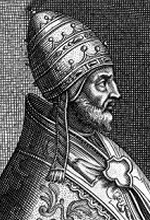Adrian V
|
Pope Adrian V |
|
|---|---|
 |
|
| Papacy began | 11 July 1276 |
| Papacy ended | 18 August 1276 |
| Predecessor | Innocent V |
| Successor | John XXI |
| Orders | |
| Created Cardinal | December 1251 by Innocent IV |
| Personal details | |
| Birth name | Ottobuono de' Fieschi |
| Born | c. 1210–1220 Genoa, Republic of Genoa, Holy Roman Empire |
| Died | 18 August 1276 Viterbo, Papal States, Holy Roman Empire |
| Previous post |
|
| Coat of arms | |
Pope Adrian V (Latin: Adrianus V; c. 1210/1220 – 18 August 1276), born Ottobuono de' Fieschi, was Pope from 11 July to his death on 18 August 1276.
Ottobuono belonged to a feudal family of Liguria, the Fieschi, Counts of Lavagna.
His first clerical position came in 1243, when he was created a papal chaplain. Subsequently he received several ecclesiastical benefices, becoming archdeacon in Bologna (1244) and Parma (1244/48–1255), canon and chancellor of the cathedral chapter in Reims (1243–1250), canon and dean of the chapter in Piacenza (c. 1247) and canon of the cathedral chapter in Paris (1244/45–1270). In December 1251, he was created Cardinal Deacon of San Adriano by his uncle Pope Innocent IV. He was also archpriest of the patriarchal Liberian Basilica (attested from 1262).
He was sent to England in 1265 by Pope Clement IV to mediate between King Henry III of England and his barons, and to preach the Crusades. He remained there for several years as the papal legate, serving from October 1265 to July 1268. His diplomatic position was such that his name is still on the oldest extant piece of English statute law, the Statute of Marlborough of 1267, where the formal title mentions as a witness "the Lord Ottobon, at that time legate in England". (Also on this legation was a young diplomat, the future Boniface VIII.) In April 1268 he issued a set of canons, which formed the basis of church law in England until the Protestant Reformation of the sixteenth century.
...
Wikipedia
